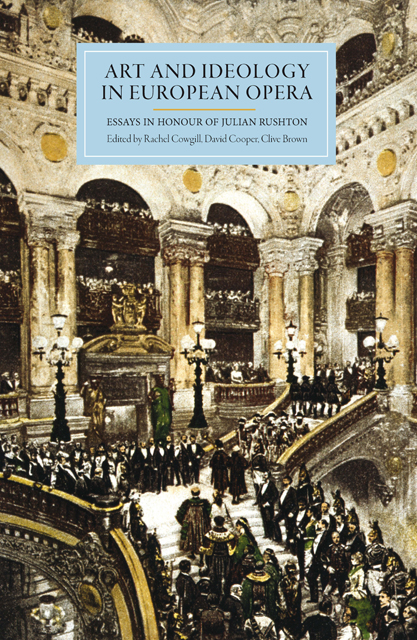Book contents
- Frontmatter
- Contents
- List of Figures
- List of Music Examples
- List of Tables
- Notes on Editors and Contributors
- Acknowledgements
- Introduction
- I Nationalism, Cosmopolitanism and National Opera
- II Opera, Class and the Politics of Enlightenment
- III Opera and Otherness
- Julian Rushton: A Family Memoir
- 7 The Works of Julian Rushton
- Index
- Tabula Gratulatoria
15 - Rimsky-Korsakov, Pan Voyevoda and the Polish Question: Exposing the ‘Occidentalist Irony’
Published online by Cambridge University Press: 28 February 2023
- Frontmatter
- Contents
- List of Figures
- List of Music Examples
- List of Tables
- Notes on Editors and Contributors
- Acknowledgements
- Introduction
- I Nationalism, Cosmopolitanism and National Opera
- II Opera, Class and the Politics of Enlightenment
- III Opera and Otherness
- Julian Rushton: A Family Memoir
- 7 The Works of Julian Rushton
- Index
- Tabula Gratulatoria
Summary
Art and ideology have been intimately linked in Russia ever since the nation began to develop a tradition of indigenous rather than imported culture around the beginning of the nineteenth century. Spurred on by the writings of literary critics such as Vissarion Belinsky and Nikolay Chernishevsky, who asserted that art should depict the very essence of everyday existence itself, or ‘life as it is’, such significant figures as Pushkin, Dostoyevsky, Tolstoy and Chekhov, among others, came into conflict with the state and the literary censor at some point in their careers, and it became almost unthinkable for great works of Russian literature not to contain elements of socio-political commentary either in favour of or against the conditions created by the autocratic regime.
In the sphere of music, opera composers were at the forefront of this confrontation. The twentieth century saw the most striking examples, Shostakovich being the most intensely scrutinized case, but earlier composers also had to tread a careful line between individual expression and state ideology. For instance, in Glinka's first opera, Zhizn’ za tsarya [A Life for the Tsar] (1836), which, far from criticizing the regime, actually promoted the imperial ideology of Official Nationality, the stylized music that portrays the invading Poles in Act 2 was met with nervous silence, as Glinka reports in his memoirs: ‘The audience was very quiet during the scene with the Poles […]. Ivan Cavos, son of our orchestra conductor, tried to reassure me, saying that this was only because the Poles were on stage.’ Throughout the nineteenth century and well into the twentieth, the spectre of the official theatrical censor hovered constantly over composers as well as authors. The difficulties that, for example, Mussorgsky's opera Boris Godunov (1868–9; rev. 1871–2) encountered with the Russian Imperial Theatrical Directorate and the censors are well documented.
Mussorgsky was not the only Russian composer of the time forced to change aspects of an opera's libretto at the insistence of the censor. Nikolay Andreyevich Rimsky-Korsakov (1844–1908) returned time and again to subjects dealing with liberty and freedom, often challenging the authority of the theatrical censor in the process.
- Type
- Chapter
- Information
- Art and Ideology in European OperaEssays in Honour of Julian Rushton, pp. 327 - 350Publisher: Boydell & BrewerPrint publication year: 2010

